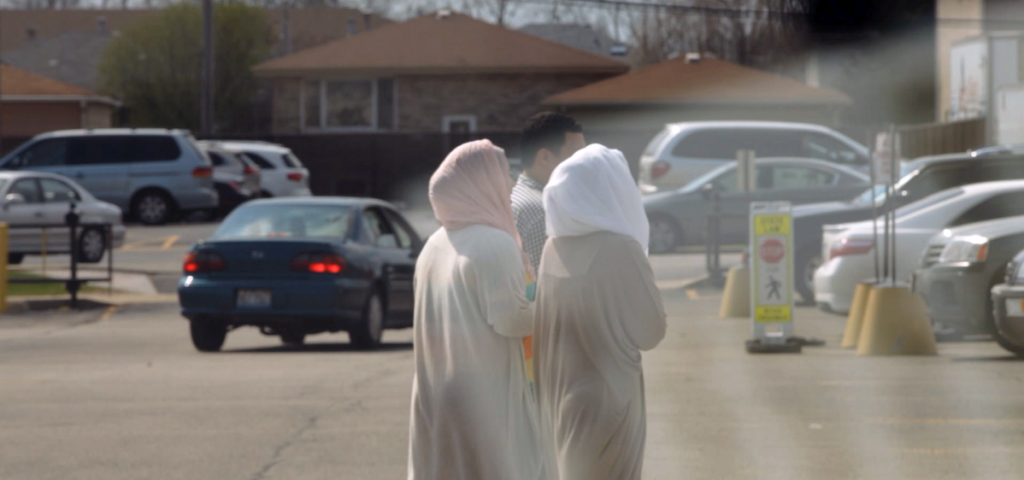Communiqué
“The Feeling of Being Watched” on POV | Monday, October 14 at 10 pm
< < Back toJournalist Assia Boundaoui Challenges the FBI’s Surveillance of Her Muslim American Community in Chicago in “The Feeling of Being Watched,” Premiering Monday, October 14, 2019
A journalist investigates rumors of surveillance in her Muslim American neighborhood
In the Muslim American neighborhood outside of Chicago where journalist and filmmaker Assia Boundaoui grew up, most of her neighbors think they have been under surveillance for over a decade. While investigating their experiences, Assia uncovers tens of thousands of pages of FBI documents that prove her hometown was the subject of one of the largest counterterrorism investigations ever conducted in the U.S. before 9/11, code-named “Operation Vulgar Betrayal.”
Directed by Assia Boundaoui, “The Feeling of Being Watched” will have its national broadcast debut on the PBS documentary series POV and pov.org on Monday, October 14, 2019 at 10:00 p.m. POV is American television’s longest-running independent documentary series, now in its 32nd season. The film was an official selection at the 2018 Tribeca Film Festival.
With unprecedented access, “The Feeling of Being Watched” weaves together the personal and the political as it follows the filmmaker’s examination of why her community—including her own family—fell under blanket government surveillance. Assia struggles to disrupt the government secrecy shrouding what happened and takes the FBI to federal court to compel them to make the records they collected about her community public. In the process, she confronts long-hidden truths about the FBI’s relationship to her community.
The film takes a personal storytelling approach, following Assia as she pieces together this secret FBI operation, while grappling with the effects of a lifetime of surveillance on herself and her family.
“I must have been 16, and I remember waking up at 3 a.m. and seeing a light outside. I got up, and I looked outside, and there were two men on a telephone pole, and they were doing something on the wires,” Assia recalls in the gripping opening scene.
“So, I freaked out. I went across the hall to my mom’s room. I woke her up, and I was like, ‘Mom, there are these two guys outside on the wire, and they’re installing something at 3 a.m. Maybe we should call the police.’ I was really upset and disturbed, and my mom was like, ‘It’s okay, calm down, it’s not a big deal. It’s probably just the FBI. Go back to sleep.”
 The film places viewers in the director’s shoes as she faces bureaucratic obstacles to collect public information, even encountering resistance from some of the community members. After realizing that her inquiries have put her on “the watch list,” Assia takes legal action to uncover the FBI’s motives for unwarranted surveillance of her family and her Muslim American neighbors.
The film places viewers in the director’s shoes as she faces bureaucratic obstacles to collect public information, even encountering resistance from some of the community members. After realizing that her inquiries have put her on “the watch list,” Assia takes legal action to uncover the FBI’s motives for unwarranted surveillance of her family and her Muslim American neighbors.
“In this time of great political turbulence in the U.S., I stand committed to creating art that speaks truth to power and is rooted firmly in the principle of the public’s right to hold its government accountable,” she says.
“I hope that this film will herald a cultural shift in public awareness on issues of government surveillance and national security and contribute meaningfully to ending U.S. government policies that allow the unwarranted profiling of communities of color in America.”
In one harrowing scene, Assia’s mother, Rabia, gets an unexpected visit from an active FBI agent in Chicago, the same agent who launched “Operation Vulgar Betrayal” in the ’90s.
“A man came knocking on the door and said his name is Bob,” Rabia tells Assia. “He asked, ‘Is your daughter making the documentary?’ I said yes. He gave me this number and said, ‘It’s between her and me.’”
“Throughout the film, the lens of surveillance is used as a metaphor for the various ways my community, and by extension Muslim American communities across the country, have been ‘seen,’” says the filmmaker. “By cinematically weaving the personal and the political— often polarized versions of the same story— I hope to capture a profound truth about the ‘War on Terror:’ its impact on our sense of self, our ability to create and connect, our right to dissent, and the effect it’s having on our collective democracy.”
“‘The Feeling of Being Watched’ gives us rare investigative insight into the way federal agencies are undermining the civil liberties of minority groups,” says Justine Nagan, executive producer/executive director of POV/American Documentary. “Using her and her family’s personal accounts of being surveilled, Boundaoui draws chilling connections with other marginalized communities that have or continue to be unjustly scrutinized by the government.”

